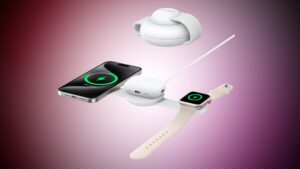Four features the iPhone should steal from Google’s Pixel 9
Apple’s iPhone 16 and Google’s Pixel 9 were released just a few weeks apart earlier this year. If you compare main features, you might suspect that the companies were working from the same blueprint: both chose to focus heavily on building in support for their in-house AI platforms. Drill down to the fine details, however, and you can see how differently Apple and Google approached their task.
Apple Intelligence, for example, is primarily there to make everyday work easier: summarizing letters, running contextual queries. When you create something new, Apple ensures it’s clear from the outset that the work is not created by human hands, but by an algorithm. It’s not a coincidence that Image Playground mainly adopts a cartoon aesthetic. Google, on the other hand, offers AI features on the Pixel 9 that can intervene deeply in the editing of photos and create lifelike images.
This is a difference in philosophy, and it’s hard to point to one or the other approach as being objectively better. But there are specific areas where we think Google has made wiser decisions, and the iPhone could benefit by following the Pixel 9’s example.
1. Get a serious power-saving mode
The Pixel 9 claims a battery life of 24+ hours. This seems impressive, but the devil is in the fine print: this figure is based on the use of Extreme Battery Saver mode, which turns off many features, pauses most apps, and slows processing to get some extra time between charges. If Apple offered something similar, it would be able to outstrip the Pixel in one of the few areas where Android phones can actually do better.
Apple doesn’t even have to look to its Android competitors for inspiration; it just has to look at the Apple Watch. Since the launch of watchOS 10, Low Power Mode has enabled owners to get half a day of extra usage out of their Apple Watches. Although there is a similar mode on iOS, it’s nowhere near as effective because it isn’t so extreme.
Under the watch’s power-saving mode, only the most essential functions remain active, while the rest are mercilessly killed off. The iPhone needs to follow Google’s lead and offer a Super Low Power Mode alongside the existing option.
2. Let the photographer join a group photo
When you take a group photo at a special event, it’s often sadly necessary that the person who’s best at taking pictures–or happens to own the best camera–is left out. But Google has come up with a clever solution to this. If you own a Pixel 9 you can take two group photos, using a different photographer each time, and then get the AI to merge the two so that all the participants are captured in a single snap.
For the philosophical reasons outlined above, Apple probably won’t do this: it’s “fake,” after all. But it’s nevertheless a cool and useful feature that’s worth consideration for a future Apple Intelligence update.
Dominik Tomaszewski / Foundry
3. Use AI to get the best group photo
In any circle of friends, there’s bound to be one person with the astonishing ability to notice when the photo is being taken and close their eyes at exactly that moment. Then, when everyone else is getting up to leave, she smiles gracefully into the camera.
With this scenario in mind, Google came up with Best Take for the Pixel 9. This clever feature picks and chooses from a series of shots to compose the best possible group photo, for example, pasting a person’s face from one shot into another so no one has their eyes closed. Wouldn’t it be nice to have that option on the iPhone?
4. Help visually impaired people take better selfies
Apple is a pioneer in the area of accessibility, but the company can still learn from its rivals.
The Google Pixel 9 has a neat feature called Guided Frame that lets visually impaired users know exactly how to align the front-facing camera to get the perfect selfie, even if they can’t see much of the screen. The instructions are given in other ways, either through haptic feedback or spoken instructions. A smart bit of lateral thinking that delivers a real benefit.




